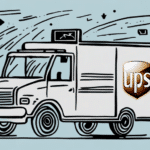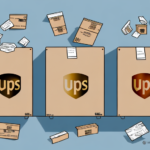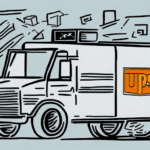Why UPS is a Top Choice for Shipping Packages Under 1 Pound
UPS is renowned for its extensive shipping services tailored to meet diverse needs, including regular ground shipping, express shipping, and international shipping options. Their reputation for reliability and timely delivery makes UPS a preferred choice for businesses and individuals aiming to ensure their packages arrive promptly.
One standout service is UPS SurePost, a cost-effective solution specifically designed for shipping lightweight packages under 1 pound. This service optimizes shipping costs by leveraging the efficiency of UPS for the initial transit and the convenience of the United States Postal Service (USPS) for the final delivery stage. According to UPS, SurePost can reduce shipping costs by up to 50% compared to traditional UPS services, making it an attractive option for budget-conscious shippers.
Different Options for Shipping Packages Under 1 Pound with UPS
Regular Ground Shipping
Regular ground shipping is typically the most affordable option offered by UPS. It is ideal for non-urgent shipments and usually delivers within 1-5 business days domestically. This option is suitable for businesses looking to minimize shipping expenses while maintaining reliable delivery times.
Express Shipping
For faster delivery, UPS offers express shipping services that guarantee delivery within specific time frames, such as overnight or within two days. While more expensive than ground shipping, express options are essential for time-sensitive shipments and can enhance customer satisfaction by ensuring timely arrivals.
International Shipping
UPS provides comprehensive international shipping services, allowing you to send packages to over 220 countries and territories worldwide. International shipping with UPS includes features like customs clearance support and global tracking, ensuring your packages reach their international destinations smoothly and efficiently.
Additional UPS Services
- UPS My Choice: Customize your delivery preferences, receive alerts, and manage deliveries through an easy-to-use online portal.
- UPS Access Point: Drop off or pick up your packages at convenient locations such as local stores or UPS lockers, offering flexibility and security.
How to Determine the Weight of Your Package for Shipping with UPS
Accurate weight measurement is crucial for shipping with UPS, as rates are calculated based on both weight and dimensions. Here’s how to determine your package's weight:
- Use a Reliable Scale: Weigh your package after it has been fully packed and wrapped to ensure all materials are accounted for.
- Round Up: UPS charges by the pound, so always round up to the nearest whole number to avoid unexpected fees.
- Check Weight Limits: The maximum weight for a UPS package is 150 pounds. For heavier shipments, consider using UPS Freight.
Additionally, for oversized packages, utilize UPS’s dimensional weight calculator to determine shipping costs based on both size and weight.
Understanding the Difference Between Retail and Online UPS Shipping Rates
UPS offers distinct shipping rates depending on whether you use their retail locations or online services. Understanding these differences can help you choose the most cost-effective option:
Retail Shipping Rates
Shipping through UPS retail locations may incur higher rates compared to online shipping. However, certain services such as additional insurance or special handling might only be available at retail centers.
Online Shipping Rates
Typically, online shipping rates are lower and offer greater flexibility. By shipping online, you can take advantage of discounted rates, schedule pickups, and manage your shipments more efficiently through the UPS website or mobile app.
For the best rates, it is advisable to compare both options based on your specific shipping needs.
How to Save Money on UPS Shipping Rates for Packages Under 1 Pound
Maximizing savings on UPS shipping can significantly reduce your overall shipping costs. Here are several strategies to save money:
- Use Online Shipping Rates: Opt for online rates instead of retail rates to benefit from lower pricing.
- Take Advantage of Discounts: Enroll in UPS discount programs available for frequent shippers or businesses shipping in larger volumes.
- Optimize Packaging: Use appropriately sized packaging to avoid dimensional weight charges and reduce material costs.
- Choose Ground Shipping: For non-urgent packages, ground shipping is often more economical compared to air shipping.
Additionally, maintaining a UPS account allows you to track shipments efficiently and manage delivery preferences without incurring extra costs for expedited services.
Tips for Properly Packaging Your Items for Safe and Secure Shipping with UPS
Proper packaging is essential to ensure your items arrive safely and securely. Follow these best practices when preparing your packages:
Choose the Right Packaging Materials
- Use sturdy shipping boxes or envelopes designed for your specific items.
- Fill empty spaces with packing materials like bubble wrap, packing peanuts, or air pillows to prevent movement during transit.
Labeling and Documentation
- Clearly label your package with the recipient’s address and your return address.
- Include any necessary shipping labels or customs forms for international shipments.
Handling Fragile Items
For fragile items such as glassware or electronics:
- Use extra padding and cushioning to protect the contents.
- Consider double-walled boxes or reinforced envelopes for added protection.
- Mark the package as "Fragile" to alert handlers to handle with care.
By adhering to these packaging tips, you can minimize the risk of damage and ensure your packages reach their destinations in excellent condition.
Understanding Dimensional Weight and Its Impact on Package Rates Under 1 Pound
Dimensional weight is a pricing technique used by UPS to account for the space a package occupies in addition to its actual weight. This means that even lightweight packages may incur higher shipping costs if they are large in size.
How Dimensional Weight is Calculated
Dimensional weight is calculated using the formula:
Dimensional Weight = (Length x Width x Height) / Dimensional FactorFor UPS, the standard dimensional factor is 166, which is used for domestic shipments. For example, a package measuring 20 inches in length, 15 inches in width, and 10 inches in height would have a dimensional weight of:
(20 x 15 x 10) / 166 ≈ 18 poundsIn this case, the shipping cost would be based on 18 pounds instead of the actual weight if it exceeds the dimensional weight.
Comparing Carriers
Different carriers have varying dimensional factors. For instance:
- UPS: Dimensional factor of 166 for domestic shipments.
- FedEx: Dimensional factor of 139 for domestic shipments.
Understanding these differences can help you choose the most cost-effective carrier for your shipments.
To avoid unexpected charges, always measure and calculate the dimensional weight of your packages before shipping. Using appropriately sized packaging can help minimize dimensional weight costs.
How to Calculate the Cost of Insurance for Your UPS Shipment Under 1 Pound
Insuring your UPS shipments provides financial protection against loss or damage. Here's how to calculate the cost of insurance for packages under 1 pound:
Determine the Declared Value
The declared value is the total worth of the shipment, including the contents and any associated costs like taxes and duties. To declare the value:
- Log in to your UPS account.
- Enter the value of each item in your shipment when creating your shipping label.
Understand UPS's Liability Limits
UPS’s liability limits vary based on the type of service used:
- UPS Ground: Typically covers up to $100 of the declared value.
- UPS Worldwide Express: Coverage limits may be higher, depending on the destination.
If your shipment's value exceeds UPS’s liability limits, consider purchasing additional insurance or express services that offer higher coverage.
Calculate Insurance Costs
Insurance costs are generally a small percentage of the declared value. For example, UPS may charge around 1-2% of the declared value for additional coverage. To get an accurate estimate:
- Use the UPS Value-Added Services Calculator.
- Contact UPS customer service for personalized quotes based on your shipment’s specifics.
By properly assessing the value of your items and understanding UPS’s insurance options, you can ensure your shipments are adequately protected without incurring unnecessary costs.
Tracking Your UPS Shipment: What You Need to Know About Delivery Updates and Notifications
Effective tracking and real-time updates are essential for managing your UPS shipments. Here’s what you need to know:
Online Tracking
UPS provides comprehensive tracking through their online tracking system. By entering your tracking number, you can monitor the progress of your shipment from origin to destination.
UPS Mobile App
The UPS mobile app offers on-the-go tracking, allowing you to receive instant updates and notifications about your shipment’s status. Features include:
- Push notifications for delivery status changes.
- Estimated delivery times.
- Options to change delivery preferences or schedule pickups.
Delivery Alerts and Notifications
By signing up for UPS My Choice, you can receive personalized delivery alerts and notifications via email or text message. This service offers benefits such as:
- Advanced notice of delivery times.
- Ability to redirect packages to different locations.
- Options to hold packages at a UPS Access Point for secure pickup.
Staying informed about your shipment’s status ensures you can manage deliveries effectively and address any issues promptly. If you encounter any delays or discrepancies, contact UPS customer service for assistance.
In conclusion, shipping packages under 1 pound with UPS offers a blend of reliability, cost-effectiveness, and flexibility. By understanding the various shipping options, optimizing packaging, leveraging discounts, and utilizing tracking tools, you can enhance your shipping experience and ensure your packages reach their destinations safely and efficiently.






















